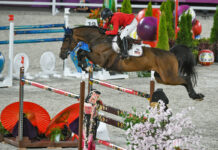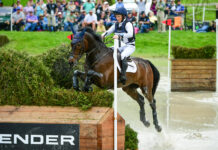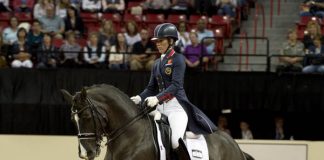 Nearly every horseperson has encountered a devoted cribber. These are horses that engage in the practice of cribbing, pressing their incisors into a stall door, fence post or whatever immobile object is convenient, and inhaling sharply. This habit can lead to chewed-up barns and fences, worn down teeth and health complications in horses.
Nearly every horseperson has encountered a devoted cribber. These are horses that engage in the practice of cribbing, pressing their incisors into a stall door, fence post or whatever immobile object is convenient, and inhaling sharply. This habit can lead to chewed-up barns and fences, worn down teeth and health complications in horses.
A new study by Swedish researchers Amir Sarrafchi and Harry J. Blokhuis suggests that there is a more harmful myth at the root of the way many horse owners manage horses that exhibit cribbing and other vices. The study, published in the Journal of Veterinary Behavior, points to research that shows that such behaviors can be linked to the way in which a horse’s environment is managed. Feeding practices, housing conditions and even weaning methods can have an impact on a horse’s potential for developing stereotypies.
The research shows that cribbing and other vices, such as stall walking or weaving (moving side to side at the front of the stall) are done by horses to cope with stress. Owners of horses with vices tend to treat the behaviors directly rather than fixing the cause of stress. Cribbing collars are put on to make it mechanically impossible for a horse to achieve the sharp inhale of cribbing. Kicking chains are put on stalled horses to provide negative reinforcement against excessive motion in the stall. But these types of treatments don’t address the stress that is believed to cause stereotypic behavior in the first place.
There is still a lot of mystery behind how stable vices develop and what causes horses to display them. In their study, Sarrafchi and Blokhuis conclude that in spite of the unknowns, growing evidence points to the importance of addressing the underlying causes of vices instead of trying to suppress the behaviors. To do otherwise, they point out, could compromise horse welfare.
 Cribbing collar |
Anecdotally, horses who are confined to stalls with little or no turnout and are fed at set mealtimes rather than being allowed to forage throughout the day seem more likely to develop vices. Keeping horses in as close to a natural state where they can move freely, graze almost constantly and interact with other, amiable equines is believed to reduce the stress that might lead to stereotypies. However, even these management changes will not solve all cases of cribbing or other problems. More research is still needed to uncover the causes of stable vices.
Further Reading
Manage your horse’s environment to curb cribbing
The stresses of easy living
Sarrafchi, Amir; Blokhuis, Harry. Equine stereotypic behaviors: Causation, occurrence, and prevention. Journal of Veterinary Behavior: Clinical Applications and Research – September 2013 (Vol. 8, Issue 5, Pages 386-394, DOI: 10.1016/j.jveb.2013.04.068)







Cribbing is “simple terrible”. I took care of a 12 yr old gelding, who would crib on my metal gates, and actually bit right through them.
my horse likes to lick on metal gates when he gets frustrated he tries to bite on them
It’s very distressing to have a horse that cribs.
While the cause and prevention of these vices is obvious, treatment is not as easy as this article is making it seem. A horse that has developed a bad habit is not likely to change years of stressful behaviour even after a change in environment and abolition of the stress.
Cribbing, I believe starts when a grazing animal, is forced to stay in a stall. They need to be out eating, which is natural for them. If not they can think of all kinds of trouble to get into.
In every magazine and here horse channel read about cribing, and that show me that all of you are too leazy to study or don’t have brains in head.
Now, what animal is the horse, solitary or heard animal?
That mean your sientiests don’t know, and for that take your sientiests and you too and lock in a 6×6 feet cage ( individual ) for a month,and all of you will understand why a horse start to crib, kick, disrespect and so on.
A horse have to be 24/7 on pasture with other horses and not in stall by him self. Emil
My horse is pasture kept (10 acres) with a herd of 4 others and he learned how to crib from a mare in an adjoining pasture. Yes, it is “Monkey See, Money Do”! My horse is only stalled during storms and has access to a round bale of hay 24/7/365 with riding of 3-4 days a week. Cribbing has an unknown cause and an unknown cure.
I believe now that cribbing is at least partially hereditary. I used to think it was learned. However, I have a cribber with 5 other horses and only her son from a line bred breeding also cribs (I swear he came out wanting to crib, only took three months to start). Her daughter on the other hand never tried (not line bred). I read an article that mentioned certain TB families have a higher rate (breeding), whereas the standardbred community which has virtually the same high stress environment has no occurrence…so we should study breeding far more than management practices.
My paint gelding has turnout 24/7, balanced quality diet and exercise. I keep an on time schedule and he also has pasture mates. He still cribs!!
I have spent time watching him to see if he has moments of stress or excitement that would lead to his cribbing. He does not show signs of either.
I have a horse that started cribbing at a barn full of cribbers. I took her home. no cribbing.
Hores out in fields crib. I find my cribber (who started because when she was weaned she was separated from the herd) cribs when she is anxious. Not happy. She has mimal stall time.
great article I also believe boredom plays a big part; however, I think they may very well be missing some minerals.
They crib because you morons lock a wild animal up in a box all day. Hereditary my ass. You people will make up reasons why horses act they way they do out of thin air because you are stupid and ignorant and selfish.